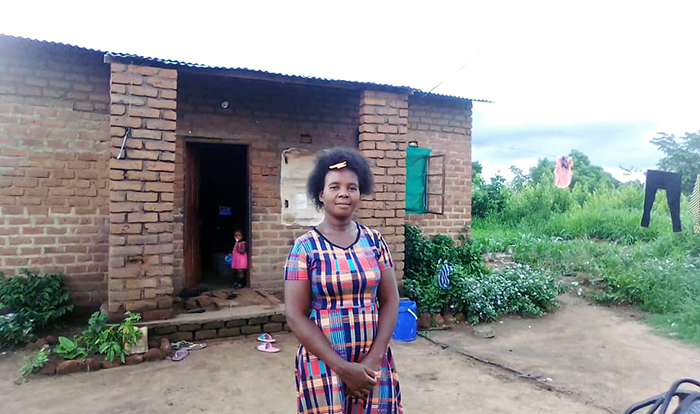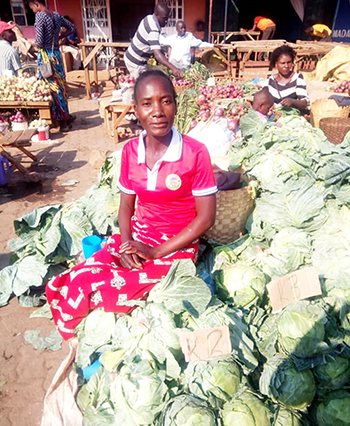ABM Archive Website
THIS WEBSITE CONTAINS ARCHIVE MATERIALS FOR HISTORICAL REFERENCE ONLY
For up-to-date information, including our latest appeals, news, and resources, please visit our current website.
Project Update: Zambia Integrated Gender Project
 |
| Diana has had electricity connected to her home since joining the Chiyambi Savings with Education Group two years ago. © ZACOP, 2019. |
Stories of Resilience in Zambia
ABM has just received a report on the Integrated Gender Project from our Zambian partner, Zambia Anglican Council Outreach Programme (ZACOP). As well as receiving much needed funding from ABM’s generous supporters, this project also receives Australian Aid funding through the Australian NGO Cooperation Program (#ANCP). And while it is clear that the project has recently overcome some pretty strong challenges, it was also able to take up some exciting opportunities that came its way.
Most of you probably don’t know that the Eastern Province of Zambia, where ABM’s Gender project is underway, was subject to drought and then flooding during late 2019 and early 2020. A bit like much of Australia. But unlike Australia, where most live in relative affluence, people living on the margins in rural Zambia cannot afford insurance, and hence the losses were heavily felt.
The heat wave dried up the food crops and vegetables, and many farm animals died due to lack of water. This led to most people spending a great proportion of their time away from their homes, looking for food for their families.
And then the floods came…
But people are very resilient and resourceful. The Savings with Education groups continued to meet and register their savings. The Gender Action Groups used the seasonal calendar to plan how best to ensure that people even in their busiest schedule were reached with the messages of putting an end to gender-based violence (GBV), and improving the status of women and girls. Information and awareness-raising sessions about gender issues for men and women both within and outside of the Anglican Church were also able to piggy-back on other regular meetings, such as in churches on weekdays and after the Sunday services.
One of the opportunities that the locally based project officers were able to pursue was to partner with a local organization, Community Market for Conservation (COMACO), in order to integrate environmental conservation aspects into the food security part of the project. To date, COMACO has assisted with training in organic farming and has provided poly-plastic and grecidia-sepium seed to the project participants to help maintain natural soil fertility. Future collaborations will involve training project participants in a variety of farming activities, including bee-keeping. This will improve their economic status.
A safe house for survivors of GBV has been built within the palace of one of the local chieftains. This will help the project ensure the protection of those survivors who need to be secluded while their cases are being investigated.
The Anglican Girls’ Brigade has been brought into discussions on GBV issues via workshops on GBV and counselling where needed, and discussions on GBV have been held with expectant mothers at the waiters’ shelter at St. Francis hospital.
Most traditional counsellors are not trained in the right topics to teach teenagers, and the project has identified the need to train them on sexual reproductive health so that they can reach out to adolescents more effectively. Some Head men/women and traditional counsellors have already decided to revise the teaching curriculum for adolescents during traditional initiation so that it is age appropriate, and focusses on ending child marriages.
Read on for some stories about individual women who are being assisted in very material ways by the economic empowerment component of the project, of which the Savings with Education groups are a key part.
Diana’s story: From maize fritters to a thriving poultry business, and electricity connected to the house
Before joining the Tikondane Savings with Education group in March 2018, Diana, pictured above, described her life as “miserable”, and she admits she was facing considerable challenges.
But Diana is a very enterprising woman.
She used her first loan from the Savings group –170 Zambian kwacha (about $18) –to buy maize flour to make fritters, and soya pieces, which she then sold to her fellow villagers. From her sales she raised about K225 ($25). Diana then applied for another loan of K200 ($22) which she added to the money she had from the sales of fritters and soya pieces.
Eventually, Diana invested her profits into buying and selling 50kg bags of maize grain. From this business she raised K10,050 ($1,116). She invested part of her earnings into a chicken rearing venture, building a poultry house and buying 123 chicks. And she was also able to have the power connected to her house.
Diana’s life has completely changed. She is no longer miserable, and she is able to meet her daily needs at home and send her children to school.
And, yes, she continues to make her maize fritters!
 |
| Catherine with her cabbages for sale at the market. © ZACOP, 2019. |
Catherine’s story: From selling cabbages to a cement floor for her house
Catherine is a member of Chiyambi Saving with Education group. Her first loan from the group was 500 kwacha ($55) with which she started buying and selling cabbages. She made K1,200 ($133) from these efforts and, after repaying her loan, was able to buy 10 packets of cement to lay on the floor of her old house.
Catherine continues to buy and sell cabbages, and says, “I’m grateful to the Savings with Education group because when it comes to paying back the loans, the interest is as low as 10%”.
(Each group discusses together and agrees each year on what interest they will charge for member loans, and for redistribution to members at the end of the year).
Thank you to everyone who has helped to empower women like Diana and Catherine. Please continue to support this project so that more families and communities will benefit from these life changes.
As well as receiving much-needed funding from ABM’s generous supporters, this project also receives Australian Aid funding through the Australian NGO Cooperation Program (#ANCP).
![]() This project receives partial funding
This project receives partial funding
from the Australian Government.
< Back


